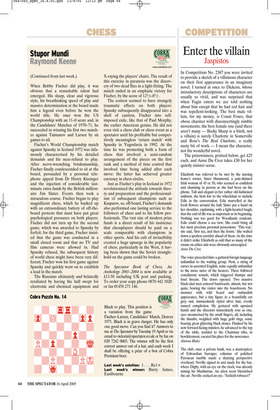Stupor Mundi Raymond Keene
(Continued from last week.) When Bobby Fischer did play, it was obvious that a remarkable talent had emerged. His sharp, clear and vigorous style, his breathtaking speed of play and massive determination at the board made him a legend even before he won the world title. He once won the US Championship with an 11–0 score and, in the Candidates’ Matches of 1970–71, he succeeded in winning his first two matches against Taimanov and Larsen by six games to nil.
Fischer’s World Championship match against Spassky in Iceland 1972 was infamously characterised by his detailed demands and his near-refusal to play. After nerve-wrenching brinksmanship, Fischer finally condescended to sit at the board, persuaded by a personal telephone appeal from Dr Henry Kissinger and the injection of considerable lastminute extra funds by the British millionaire Jim Slater. Events then took a miraculous course. Fischer began to play magnificent chess, which he backed up with an extraordinary battery of off-theboard protests that must have put great psychological pressures on both players. Fischer did not turn up for the second game, which was awarded to Spassky by forfeit; for the third game, Fischer insisted that the game was conducted in a small closed room and that no TV and film cameras were allowed in. Had Spassky refused, the subsequent history of world chess might have been very different; Fischer won his first game against Spassky and quickly went on to establish a lead in the match.
The Russians ultimately and belatedly retaliated by having the hall swept for electronic and chemical equipment and X-raying the players’ chairs. The result of this exercise in paranoia was the discovery of two dead flies in a light-fitting. The match ended in an emphatic victory for Fischer, by the score of 121/2–81/2 .
The contest seemed to have strangely traumatic effects on both players: Spassky subsequently disappeared into a shell of caution, Fischer into selfimposed exile, like that of Paul Morphy, the earlier American genius. He did not even visit a chess club or chess event as a spectator until his profitable but competitively meaningless ‘return match’ with Spassky in Yugoslavia in 1992. At the time he was promoting both a form of chess that involved a semi-random arrangement of the pieces on the first rank and a method of time control that involved time being added after each move: the latter has achieved greater currency in chess circles.
Just as Fischer’s play in Iceland in 1972 revolutionised the attitude towards theory and preparation and the professionalism of subsequent champions such as Kasparov, so, off-board, Fischer’s demands also performed one lasting service to the followers of chess and to his fellow professionals. The vast size of modern prize funds is a direct result of his insistence that chessplayers should be paid on a scale comparable with champions in other sports. And his cult of invincibility created a huge upsurge in the popularity of chess, particularly in the West, it having been shown that the Soviet stranglehold on the game could be broken.
The Spectator Book of Chess, An Anthology 2001–2004 is now available at £13.50 including UK post and packing. To order your copy phone 0870 442 1020 or fax 01458 271 146.
Black to play. This position is a variation from the game Fischer–Larsen, Candidates’ Match, Denver 1971. Black is in grave danger. He has only one good move. Can you find it? Answers to me at The Spectator by Tuesday 19 April or via email to victoria@spectator.co.uk or by fax on 020 7242 0603. The winner will be the first correct answer out of a hat, and each week I shall be offering a prize of a box of Cobra Premium beer.
























































 Previous page
Previous page